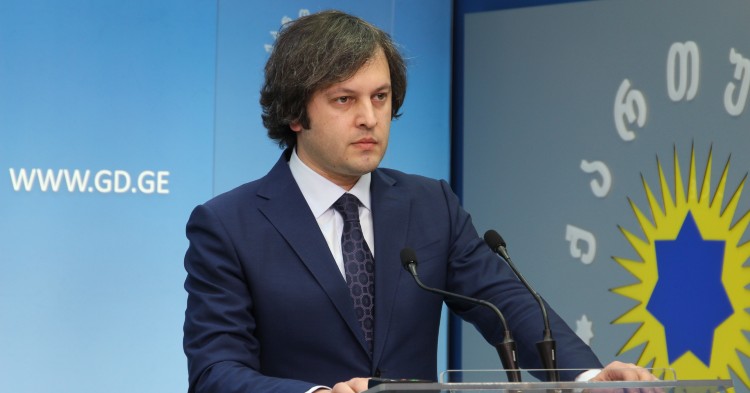Ruling party head: “no humanitarian goals” behind calls for Saakashvili's release

In an interview with Imedi TV, the ruling party Chair claimed Zourabichvili had received over 1.1 million votes in the 2018 election from voters who did not want to see UNM - which formed the Government between 2004-2012 - regain power in the country. Photo: Georgian Dream Press Office
Irakli Kobakhidze, the Chair of the ruling Georgian Dream party, on Thursday said President Salome Zourabichvili would need to consider her voters’ 2018 rejection of the opposition United National Movement party in deciding whether she would pardon the imprisoned former President Mikheil Saakashvili.
Making the comment amid calls by the UNM opposition for granting Saakashvili a release or postponement of the rest of his sentence on medical grounds, Kobakhidze said Zourabichvili should take into account the “position of her voters against a return to power” of the party.
In an interview with Imedi TV, the ruling party Chair claimed Zourabichvili had received over 1.1 million votes in the 2018 election from voters who did not want to see UNM - which formed the Government between 2004-2012 - regain power in the country.
When it comes to pardoning Mikheil Saakashvili, the only goal behind [the calls] is that the United National Movement party returns to power, the situation [in the country] becomes disorderly, and then these people will lead us to the same results that they led us to in 2008 [in reference to the Russian invasion in Georgia]”, the GD official said.
“Therefore, at the very least, the President should consider the position of her voters that she was supported for in 2018, and that was the non-return of the United National Movement party”, Kobakhidze said, adding “There are no humanitarian goals behind Saakashvili's release - the only goal is to return this criminal political force to power”.
Zourabichvili on Wednesday said the “principal question” on whether she would pardon the imprisoned former President Mikheil Saakashvi would be “answered in time”.
She also told the BBC last month she had “no power” to pardon Saakashvili as cases against the latter were still pending and the domestic legislation prevented pardons from being issued before all outstanding court cases against individuals were completed.
The President also told the channel she would not pardon Saakashvili as she did not wish to “become an instrument for more polarisation” on the domestic political scene, and referenced the “autocratic” former Government of Saakashvili as her motivation against issuing a pardon.
 Tweet
Tweet  Share
Share